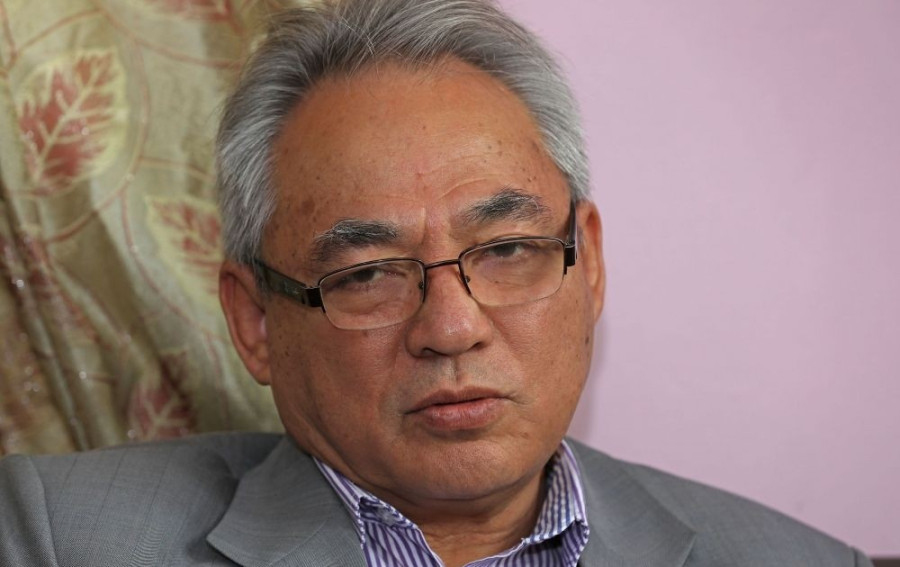Valley
Lawmakers criticise home minister over Police Bill
At a time when the seven provinces are voicing serious discontent at the federal government, alleging that they were being stripped of their constitutional rights, lawmakers have also expressed serious concerns over the bill on Nepal Police and provincial police tabled at the House of Representatives.
Tika R Pradhan
At a time when the seven provinces are voicing serious discontent at the federal government, alleging that they were being stripped of their constitutional rights, lawmakers have also expressed serious concerns over the bill on Nepal Police and provincial police tabled at the House of Representatives.
All the lawmakers, except one, speaking during Tuesday’s theoretical discussion on the bill, mostly from the two ruling parties, criticised the government for drafting the bill without “reading” up the constitutional provisions.
They warned of “revolt” and “dire consequences” if the bill was endorsed without making major corrections—especially on the provisions that curtail the constitutional rights of the provinces.
In line with the provincial governments, some lawmakers even urged the Centre to annul the bill, claiming that it would further escalate the tension between the provincial and federal governments, which they said would threaten federalism.
Last month, internal affairs and law ministers of six provinces met in Chitwan and decided to pressure the federal government to withdraw the bill—or to put pressure on the authorities to correct its provisions. The major concern of the lawmakers was over making the chief district officers ‘more powerful’ than provincial authorities.
The bill registered in Parliament on January 14 has provisions to empower CDOs, authorising them even to deploy provincial police.
The CDO will work as a representative of the federal government, coordinating between the offices in the districts except for the court and defence outposts, states the bill. All the security agencies in the district should work as instructed by the CDO. The CDO reports the law and order situation to the Federal Home Ministry and the provincial Internal Affairs Ministry and s/he takes the instruction of both the ministries.
Most vocal critics of the bill were lawmakers from the ruling Nepal Communist Party (NCP), including former home minister Janardan Sharma, who questioned the intention of the government and termed the provisions “unfortunate”. He even charged the drafters of the bill with not going through the pages of the constitution. “It’s a bill full of faults,” he said.
“If we move forward with this bill, the ongoing conflict between the federal and provincial governments will escalate. Instead of development and prosperity, we will be stuck in infighting,” he said.
Most lawmakers claimed that the intention of the government was to develop the provincial and local governments as its units to implement their vested plans and projects going against the spirit of federalism.
“This is against federalism for which we all fought. We can never accept it,” said Sharma, the NCP leader.
Like in the Panchayat period, the Centre wishes to run seven “development regions” through their “administrators” as CDOs, claimed Nepali Congress lawmaker Amresh Kumar Singh. “Will the CDOs be held accountable for the peace and security affairs of the provinces? The government should publicly declare that they are against federalism,” he said.
Pradip Yadav, a lawmaker from the Sanghiya Samajbadi Forum-Nepal, went on to demand that the government withdraw the bill at the earliest. “This government is killing its own child,” he said, referring to the newly adopted federalism in the country.
Even the chief ministers are fed up with the activities of the central government, some lawmakers claimed.
“Like the prime minister at the Centre, all the chief ministers must be equally equipped with necessary powers to strengthen federalism,” said Uma Shankar Argariya, another lawmaker from the SSF-Nepal.
Citing possible consequences of the bill, NC lawmaker Dibya Mani Rajbhandari said the country would have a disaster if the bill was passed without changes. He was referring to possible tension between the Centre and the provinces.
Except NCP lawmaker Krishna Bhakta Pokhrel, all the lawmakers of the ruling NCP, including former minister Rekha Sharma, Ram Kumari Jhakri, Anjana Bishankhe and Navaraj Silwal, and Pradip Yadav and Uma Shankar Aargariya of the SSF-N came down heavily on the federal government.
Home Minister Ram Bahadur Thapa defended the bill urging the lawmakers to think of the existing “unique political situation of the country that has an open border with the southern neighbour and the movement of the secessionists.”
Thapa, who is a Secretariat member of the ruling party, however, said the responsibility of drafting the laws falls under Parliament and that lawmakers could do the needful and amend it.
He claimed that the chief district officers have not been made as powerful as claimed by some lawmakers but would be placed there just to coordinate between Kathmandu and the provinces.




 9.83°C Kathmandu
9.83°C Kathmandu














